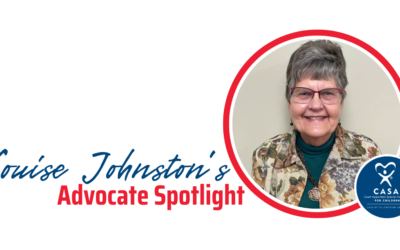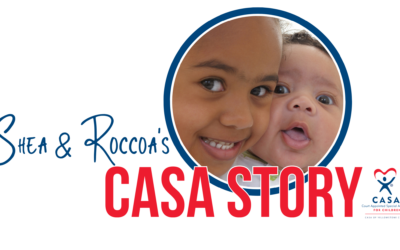Wrapping up my fourth year (and going strong!) here at CASA of Yellowstone County, I’ve been thinking a lot lately of one of my own childhood experiences. When I was 15 years old, just finished with driver’s ed and saving up for a car, I got a babysitting gig through Billings Job Service. The family had two young kids and were looking for a babysitter while the parents were at work. I wasn’t used to babysitting kids I didn’t already have a relationship with, but the scheduling worked well with my mom’s, upon whom I relied for rides that summer, so I signed up.
The family lived in a small house, and the dad gave me a crash course before he took off for work on the first day. The little girl was about four, as I remember, and her brother was about two years old. The little girl was running around in a diaper and an oversized T-shirt, one of her mom’s. The dad told me the time for the little guy’s afternoon nap. He also told me he’d be by with lunch midday and not to be surprised if the mom showed up unannounced to check on us, and then he left for work.
I don’t remember how we passed the morning. There are a few different gaps in my recollection of this day, I suspect because I didn’t see any red flags until lunchtime rolled around. Dad showed up with pizza, made sure the kids were in one piece, and took off for work again. That’s when I walked into the kitchen, which I can still vividly picture in my mind’s eye. There was an industrial sized trash can that was overflowing, and there were big, juicy flies everywhere. I went into the refrigerator to get a little something to supplement the pizza, but I only found pop. So I got us all some water and strapped the little guy into his seat at the table, and we tucked in. Everything was trucking along nicely until the little guy accidentally knocked over his water. He immediately looked at me in what I can only call terror and burst into tears. I looked for paper towels or dish towels and didn’t find any, so I used paper napkins to first dry the spill and then his tears. Something was off. I could only assume he was so worried because he had been punished for spilling his drink in the past—something that I still do with ridiculous frequency as an adult.
After lunch, it was time for the little guy’s nap. So the little girl and I sat down in the living room, dominated by a couch and a huge TV, to watch a movie. But she wasn’t interested. She snuggled up to me as if she had known me her whole life. At one point, I started tickling her, and the delightful belly laugh that came out of her little body is something that has stuck with me. I remember thinking it sounded like she didn’t get to laugh as often as a child should and was making up for lost time with her complete surrender to a simple tickle.

via Cottonbro
I’m not sure what else happened that day. I think I had a vague notion of cleaning up a little and taking out the trash, but I wasn’t a skilled multi-tasker at that point, and with the little girl wanting to be right by my side, I didn’t want to be doing chores her regular caregivers should have been doing for her. The rest of the day is a blur until I remember my mom coming to pick me up after she got off work. In the car, I just cried. I knew that that home was not okay for those kids—the unsanitary conditions, the lack of food, the way the little guy seemed afraid of punishment for a simple mistake—even how happy the little girl seemed to be because someone was playing with her. I didn’t know what to do. It was summer, so I couldn’t talk to a teacher or school counselor about what steps I could take to get the family some help. My mom was working at a nursing home, so while she knew just what to do when it came to seniors, she was at a loss of what to do to help kids who were in need. And we didn’t even own a computer, so the internet wasn’t an option to research answers to all my questions.
What I did know was that that home was not the place for me. It broke my heart to see those kids, and I didn’t feel strong enough to keep going back to the home and figure out a way to help them. So that evening, on the way to dropping me off for youth group, my mom took me to their house, and I told the parents I wouldn’t be back the next day. I didn’t give a reason, and they didn’t ask. They just took the information and bade me farewell. At youth group, I told my youth pastor about the whole situation, which was a strategy my mom and I had arrived at that afternoon. We figured if anyone could give me advice, he could. (He’s still a well respected pillar of the community to this very day, and I’d take his advice to the bank.) I think he told me he understood the turmoil I was going through, but we left it at that. Since I hadn’t seen any evidence of abuse, what could I do?

Kristina Paukshtite
I think about that family periodically. I don’t remember their names. I hope they’re okay. I hope they got the help they so clearly needed to have a thriving household of love, plenty, and safety.
Perhaps I’m thinking about them so much lately because I have seen so many cases that are similar to what I glimpsed that summer. And I find myself wondering what I would have done if I knew then, as a 15-year-old, what I know now. I certainly would have called Centralized Intake, Montana’s child abuse hotline, to report my concerns. I know now that evidence of abuse is not the bar that any concern needs to reach. Rather, suspected neglect should be reported, as well—not to point a finger and yell “Gotcha,” but to help the family connect with services that would support them and provide them with the means they needed to rise above their circumstances.
Was that home a clear-cut example of neglect? I think back on that house and am not sure whether it meets the minimum sufficient level of care that is the benchmark for removal. There was very little food, but perhaps pay day (or food bank box day) was right around the corner. The kids had full bellies by the time we polished off the pizza. I didn’t know the plan for dinner. Maybe there was a plan. Maybe there wasn’t. The kitchen was in horrible shape, but there could have been all kinds of extenuating circumstances—recent mental and/or physical illness, for example. Sure, the little girl was wearing minimal clothing of an ill-fitting size, but she was covered up, and the house was at a comfortable temperature.
Knowing what I know now, more alarming than any physical issues I observed in the home are the more subjective, less tangible red flags. The little guy’s abject fear when he thought he was in trouble made me, even then, wonder if he was punished severely for little accidents. The little girl’s glee, something that seemed so novel to her, made me wonder if she ever got the chance to just laugh like a kid. And even the fact that these parents would trust me, a kid myself, with their children for hours at a time leads me to wonder if they were exercising protective capacity.
I know I put that family in a bind when I told them I couldn’t watch their kids the next day. Did one of the parents have to call in to work in order to stay home, potentially risking their job? Did they have to resort to another unknown, potentially unsafe caregiver in order to show up for work and get their next paychecks? I’ll never know.

Juan Pablo Serrano Arenas
The other angle of this whole saga that has struck me lately is the resilience baked into my own childhood and youth. Even when my family couldn’t afford a second vehicle so I could get around, my mom drove me where I needed to be in order to save up for that first car (a $500 ’75 station wagon, thank you very much). I had both my mom and my youth pastor as supportive adults who I could turn to when I was faced with a tough situation. Going into that home (and especially if I went back) could have left me with some unresolved secondary trauma, but I had caring adults who talked it through with me and gave me room to not go back into a situation that was too much for me.
As with many things related to CASA, I don’t know how this story ended for those kids. But what I do know is there are countless kids in our community today who are living in similar situations. Some of them, deemed to be neglected by their parents, have been placed in foster care and desperately need a responsible, caring adult to be their voice. Court Appointed Special Advocates are uniquely positioned, trained volunteers who will be a constant in each child’s life and help change that child’s story. If you would like to find out more about how you can positively impact a child who has been abused or neglected, please call the CASA office at (406-259-1233 or email emily@yellowstonecasa.org
Ashley Milsop is a Program Coordinator for CASA of Yellowstone County.





